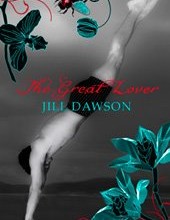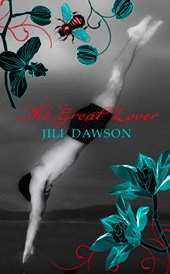
Sometimes reviewing books can be a solitary and frightening experience. When I ordered The Great Lover, I knew I was taking a risk. I’d first contacted Jill Dawson to tell her how much I’d admired her novels Wild Boy and Fred and Edie, and we’d sort of kept in touch, so what was I to say if I didn’t feel the same about The Great Lover?
There was already a strike against it in my mind. Rupert Brooke, who is one of the two central characters in the novel, has always been my least favourite of that generation of poets. I’ve never felt the appeal of his work in the way that others seem to.
And so I sat down to read, feeling nervous. In the big scheme of things it wouldn’t matter much if I didn’t like the novel. It certainly wouldn’t affect Jill, who is garlanded with awards. But there was a question that everybody has to deal with at some point, that question of personal integrity – if I didn’t find merit in the novel, I felt I was going to have to say so, just because I had, in the past, expressed my feelings about other novels. To damn with faint praise would be hypocritical, to remain silent would feel like an abdication of my tiny role as a writer and reviewer. And while it is a tiny role, it is one that I’ve made for myself and I didn’t want to corrupt or denigrate it. In 2008 I already had to tell two writers that I wouldn’t review their novels, one because I didn’t think it would interest you, lovely readers, and the other because I felt it just wasn’t good enough (and having been self-published, hadn’t been given that rigorous test of publication-worthiness that until very recently has been at least one arbiter of value).
And yet, Dawson has pulled it off. Through the creation of a young maid, Nell Golightly, whose views of, and relationship with, Rupert Brooke, counterpoint his narration, we see Brooke as an attractive, often weak, but always original character. We see how he might appeal to a young woman, and to young men, and yet how his burnished good looks, his charming manner and his earnest desire to improve the world could have been an appalling burden for a young man trying to understand the world, and his place in it.
Nell is no cypher – while she dismisses Suffragists as not caring for the working woman, or understanding their real needs, she is full-blooded, canny and quite able to, as she puts it, ‘face facts’. The facts that she faces at the end of her life are the possibility that Brooke had an illegitimate child in Tahiti, as well as definitely being a Sodomite in Grantchester. And the facts that she reveals, as she recounts her short time spent observing the Brooke circle as a maid of all work, cast an entirely imaginary, but utterly believable, light on the young and troubled Rupert that allows the narrative leap into areas of his life that we know little of.
As always, Jill Dawson’s work is lush – her sense of place and season makes every scene utterly concrete, and her poet’s eye for telling detail gives an almost emblematic value to certain aspects of the narrative, in particular the honey that Nell makes both at home in the Fens and in Grantchester as a beekeeper’s assistant, and the implements of household drudgery: the kettles and fires and bedclothes and polish, that make Nell’s life meaningful.
And in the end I did love it. Not, perhaps Brooke, although I certainly like him better than I did, but Nell is compelling, convincing and fascinating. It’s transporting and lovely and a subtle psychological portrait of a man and a time that I feel I know better now, and care more about, than ever I did before. Is it worth reading? Absolutely – you will not waste a minute you spend with this novel!



Recent Comments